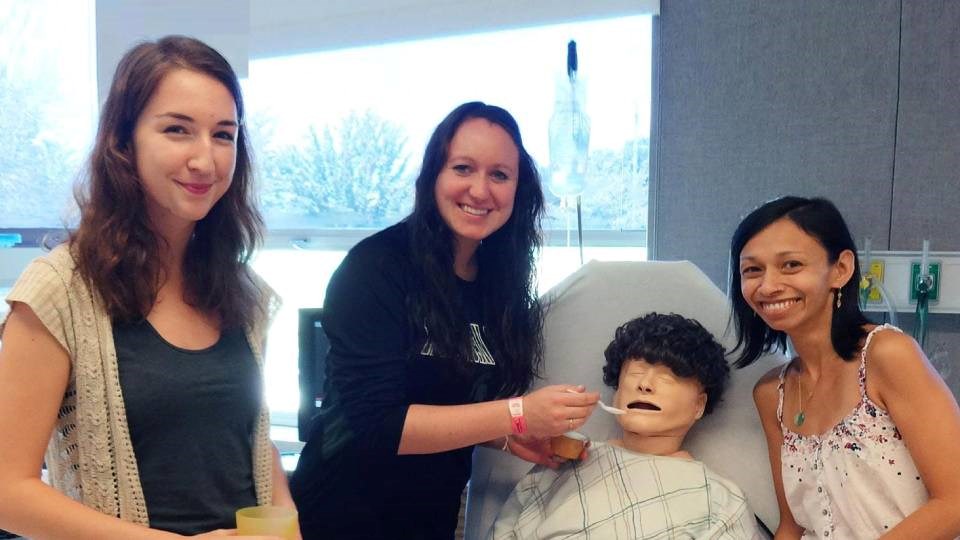The cry for solutions to the long-term care crisis has been plaguing communities across Ontario long before the pandemic.
But when the pandemic hit, our most vulnerable were impacted first and the crisis shone a spotlight on the state of long-term care, highlighting the need for more staff to care for residents.
The Ontario government introduced tuition support for students entering the personal support worker (PSW) program in colleges across Ontario in 2021, committing to $200 million to train up to 16,200 personal support workers. More recently, the Ontario government reintroduced the support for personal support worker programs by investing $54.7 million for up to 4,000 new students in private career colleges in Ontario.
Lori Bertrand, program coordinator for Sault College’s personal support worker program, said that in spring 2021 they welcomed approximately 60 domestic students to an accelerated program.
The one-year program teaches students the skills to provide care for the elderly, the chronically ill, and people with accessibility challenges. Graduates can find work in long-term care facilities, hospitals, home-care settings, and more.
“We normally have about 20 to 35 students for every intake — September, January and May — but the accelerated program, which was compressed from eight months to six months, had a total of 60 students among the two cohorts because it was free,” Bertrand explained.
The initial investment was only for domestic students, but international students are now eligible for financial support.
Many of those students completed the program and are now working in Sault Ste. Marie long-term care agencies.
“The tuition award is very helpful,” Bertrand added.
Students would receive up to $2,000 in tuition and a payment for clinical hours they completed for their placements.
Chris Derro and his wife, Wendy Bird, of Sudbury, both transitioned from broadcast journalism jobs to working in long-term care.
Bird took advantage of the free tuition in 2021 to compete her PSW training at Cambrian College with classes both online and in person.
“It made the transition possible,” Bird admitted.
Derro, who spent decades in radio broadcasting and then two years working for an Indigenous health-care organization as a communications specialist, transitioned into front-line work in long-term care. With his arts degree, he qualified for a position as a lifestyle enrichment assistant (LEA), someone who develops and organizes activities for residents.
“COVID brought to the surface the problems that already exist in the system,” said Derro.
Aside from learning about the state of long-term care from his wife, he witnessed the stress PSWs are working under and the impact it has on residents.
Both agree that long-term care is short on people, whether PSWs, LEAs or food service workers.
“You are caring for more than is manageable and it’s not just your unit," Bird said. "If someone needs to take a break, they need someone to fill in."
With a shortage of staff in long-term care, inevitably residents' quality of care is diminished. According to the Fraser Institute, an independent, non-partisan research and educational organization, seniors currently compose 17.6 per cent of Ontario’s population, and their share of the province’s population will continue to grow and reach nearly 24 per cent by 2043, continuing to increase the pressure on long-term care.
As a LEA, Derro directly supports residents and the PSWs.
“While I am with residents I am taking psychosocial analysis on behalf of the team. If I see something off, maybe a resident hits another resident, we document everything,” said Derro.
The other half of his job is entertaining residents, from weekly bingos to one-on-one chats for those residents restricted to their beds.
“It’s important to be connected so residents feel comfortable to share their needs and create a community,” explained Derro.
It is a significant difference for Derro, who was handing out free Shania Twain tickets as a radio host in his previous life, to now experiencing the loss of residents.
“We lost two residents in less than a week," he said. "It changes you."
Although the financial incentives were important for Bird, she acknowledges that there is a stigma to personal support work as a ‘dirty job’ or for people who can’t do anything else. However, both Bird and Derro have come to appreciate the privilege of working with some of the most vulnerable in the community and have no regrets with their career change.



